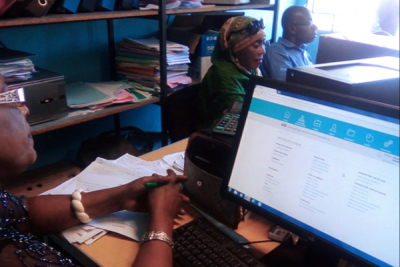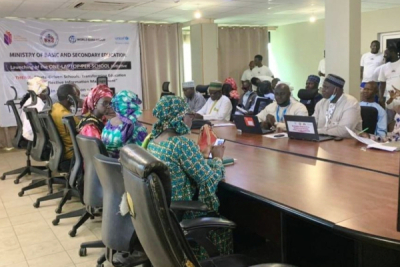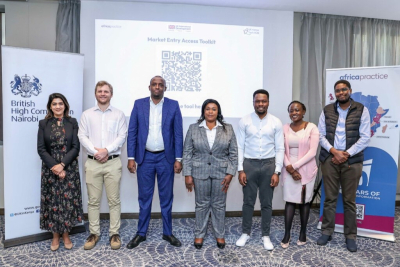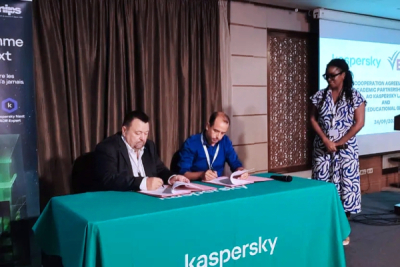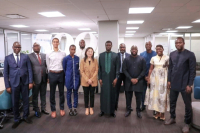
News (1789)
As Africa's digital economy expands, with industries like fintech, e-commerce, and agritech growing rapidly, cyberattacks pose a significant threat. A secure digital environment is essential for sustaining investor confidence, driving innovation, and enabling businesses to thrive.
SEACOM announced on October 1 a new partnership with US-based cybersecurity firm Arctic Wolf to enhance its cybersecurity services across Africa, addressing the growing threat landscape on the continent. With cyber-attacks increasingly targeting businesses of all sizes, this collaboration aims to provide SEACOM’s clients with advanced security operations solutions through Arctic Wolf’s cloud-native platform and expert security teams.
The partnership enables SEACOM clients to benefit from proactive and tailored protection against current and emerging threats. SEACOM emphasizes that Arctic Wolf’s platform will offer comprehensive visibility into customers' attack surfaces, allowing businesses to monitor their entire security environment from one central interface. This approach ensures rapid identification and response to malicious activities or vulnerabilities.
SEACOM’s portfolio will now include Arctic Wolf's suite of security solutions, such as Managed Detection and Response, Incident Response, and Cloud Security Posture Management.
Cybercrime is a growing threat in Africa, with ransomware attacks becoming more frequent. According to the ‘INTERPOL African Cyberthreat Assessment Report 2024,’ in early 2023, 1 in 15 African organizations experienced weekly ransomware attempts, much higher than the global average of 1 in 31. It adds that Kaspersky recorded over 300 attempts in South Africa in just one week. The financial impact of cybercrime in Africa is immense, with INTERPOL’s 2021 report estimating it at over $4 billion, or 10% of the region’s GDP. Additionally, cyberattacks on African organizations increased by 23% in 2023, marking the highest rate globally.
The growing threat particularly affects businesses and organizations lacking the resources to effectively monitor and respond to security incidents. This move highlights the need for advanced security strategies to safeguard operations in an increasingly digital world.
Hikmatu Bilali
She is determined to transform access to technology for artisans in Africa. Through her startup, she aims to simplify life for entrepreneurs in the informal sector.
Bams Betga (photo) is a Cameroonian artist and entrepreneur, co-founder, and CEO of African Puzzle Works, a company that specializes in creating software for artisans. Founded in 2021 by Betga and Renée Clément, African Puzzle Works is committed to innovation aimed at supporting entrepreneurs in the informal economy.
The company developed African Puzzle, a personal assistant designed specifically for entrepreneurs and project leaders. This mobile application, which utilizes audio and photo-based features, allows users to easily manage orders, client information, appointments, product catalogs, and track finances—without requiring literacy skills. "With our voice and image-based features, we remove the barriers to adopting technology for entrepreneurs with limited literacy. Everyone knows how to send a voice note or take a photo," explained Betga in 2024.
A former athlete, Bams Betga is also a singer-songwriter with four albums to her name. As the international partner of the World Business Angels Investment Forum in Cameroon, she is dedicated to improving access to financing for businesses. Additionally, she serves as the national representative for Cameroon’s startup ecosystem in the G100: Mission Million, a group of 100 women leaders worldwide.
In 2022, African Puzzle Works won first prize at the Blue Ocean Awards, which recognizes entrepreneurial innovation. More recently, in April 2024, Betga was nominated for Best Africa Solutions at the second edition of the Africa Solutions Week (SAS), held in France in September and scheduled to take place in Morocco from October 17 to 19, 2024.
Melchior Koba
The Comoros' digitalization project is expected to cost €22.53 million (approximately $25 million). The African Development Fund, the concessional lending arm of the African Development Bank (AfDB), has granted €4.02 million, while the Transition Support Facility has released €5.49 million.
The Board of Directors of the African Development Bank Group (AfDB) approved a €9.51 million ($10.5 million) funding package for the Comoros on Monday, September 30. These funds will support the implementation of the Comoros Economic Digitalization Support Project.
“The objective of the project is to promote the emergence of a comprehensive and coherent range of digital services that can meet the needs of the population, with the ultimate goal of aligning the country with the information society,” the institution said in a statement.
This initiative comes as digital transformation accelerates across the continent. According to the Measuring Digital Development – ICT Development Index 2024 report, published in July 2024 by the International Telecommunication Union (ITU), the Comoros ranks 25th in Africa with a score of 46.5 out of 100 on the ICT Development Index, below the African average of 50.3.
In terms of the E-Government Development Index (EGDI), the Comoros score significantly trails the African average of 0.4247, according to the E-Government Survey 2024: Accelerating Digital Transformation for Sustainable Development, published in September 2024 by the United Nations Department of Economic and Social Affairs (UN DESA). The country ranks 45th, with a score of 0.2586 out of 1.
The implementation of this project is expected to help the archipelago develop digital infrastructure, create a favorable regulatory and legal framework, enhance digital education and training, and promote technological innovation and entrepreneurship.
Adoni Conrad Quenum
In The Gambia, the government is stepping up efforts to accelerate digital transformation. This affects all sectors of the economy, including education.
Last week, the Gambian government launched an initiative to provide laptops to the principals of all schools across the country. This effort, in partnership with the Global Partnership for Education (GPE), UNICEF, and the World Bank Group, is expected to drive the digitalization of school administration.
“The initiative marks a significant step in our efforts to enhance quality education and empower school managers with the tools needed for efficient service delivery in the digital age,” said Pierre Gomez, Minister of Higher Education, Research, Science, and Technology.
The Gambian government aims to digitize the national education system as part of its broader ambitions for digital transformation. According to Minister Gomez, the government is working to develop digitized information systems, enhance the digitalization of public services, and expand the use of electronic record management systems across all public administrations.
In September 2023, the government launched the Gambia Research and Education Network (GAMREN), in partnership with the World Bank, to provide high-speed internet connectivity to schools and research institutions nationwide. As early as July 2022, the Ministry of Higher Education, Research, Science, and Technology had begun efforts to develop a national strategy for digitizing technical and vocational education and training, with support from UNESCO.
UNESCO believes technology can significantly enhance educational management. "It enables a wider range of data collection on schools and students, allowing for precise analysis of learning paths and influencing factors. This data can be used to personalize learning, identify marginalized children, and prevent disengagement and early dropout," the organization stated in its 2023 Global Education Monitoring Report.
Isaac K. Kassouwi
Africa's fragmented regulatory landscape often poses significant challenges for entrepreneurs, who face different requirements in each country. Leveraging digital tools to lower entry barriers and provide a structured pathway for market expansion can boost economic transformation in Africa.
The UK, in collaboration with PwC, has introduced a digital toolkit through the UK-Kenya Tech Hub to aid entrepreneurs in accessing the Kenyan, Nigerian, and South African markets. The toolkit, launched on September 26, aims to streamline market entry and enhance opportunities for startups across various sectors, including agriculture, education, financial services, health, and manufacturing.
Jordan Kyongo, Head of the East Africa Research and Innovation Hub at the British High Commission in Nairobi, highlighted the importance of this initiative. "This toolkit will be an instrument in growing Africa’s entrepreneurial ecosystem by consolidating the requirements for market entry, ultimately easing the process for entrepreneurs," Kyongo stated.
The toolkit was developed to address the regulatory, certification, and tariff barriers that entrepreneurs often face when expanding into new markets. It includes practical tools, guides, and outputs designed to simplify the market entry process in the three targeted countries. Feedback from multiple validation sessions has helped refine the toolkit, making it a user-friendly resource for entrepreneurs navigating complex regulatory landscapes.
According to an article by AU Startups on ‘How African Tech Startups Can Navigate Regulatory Challenges,’ African startups face constant hurdles, including creating scalable solutions in unpredictable markets and securing funding in volatile economies. Additionally, complex and restrictive regulations in both their home markets and potential expansion areas further complicate operations, making compliance a crucial factor that can determine their success or failure. The toolkit aims to reduce the administrative burden by providing clear, consolidated information for market entry in Kenya, Nigeria, and South Africa. It also serves as a foundation for expanding similar initiatives into other African markets.
This digital toolkit could be a game-changer for African entrepreneurs, offering a model for overcoming market access challenges and promoting sustainable business growth.
Hikmatu Bilali
The acceleration of digital transformation in Africa has created a growing demand for cybersecurity professionals. According to the World Economic Forum, the global talent shortage in this field could reach 85 million workers by 2030.
Last week, Russian cybersecurity provider Kaspersky partnered with EPI Sup de Sousse, a private Tunisian university, to train a new generation of cybersecurity experts, foster innovation, and strengthen Tunisia's cybersecurity ecosystem.
This partnership comes at a time when Tunisia is facing a high number of cyber incidents. In 2023, TunCERT, the country's national computer emergency response team, recorded nearly 150,000 incidents affecting the national cyberspace. Of these, 46% were phishing attacks, while 17% involved malware.
According to the International Telecommunication Union (ITU), Tunisia scored 82 out of 100 in the 2024 cybersecurity index, placing the country in Tier 3, indicating a "basic commitment to cybersecurity actions led by the government." However, this score marks a decline from 2020, when Tunisia scored 86.23, positioning it as one of the continent’s leading players.
For Kaspersky, this partnership could help identify future talent and contribute to the development of Tunisia's cybersecurity community. According to the World Economic Forum’s Cybersecurity Talent Framework, there is an urgent need for nearly 4 million professionals in 2024 to bridge the global talent gap, with a growing demand for expertise in cloud security, artificial intelligence, and machine learning within the cybersecurity sector.
Adoni Conrad Quenum
African countries are rapidly modernizing their digital systems, adopting a range of technologies to improve efficiency and transparency. As they embrace this digital transformation, they also need to prioritize cybersecurity to protect sensitive data and prevent potential threats.
Burkina Faso plans to modernize and secure its online services with the adoption of a national public key infrastructure (PKI). On Monday, September 30, the country’s National Agency for Information System Security (ANSSI) launched a project framework workshop in Loumbila, located in the Oubritenga province.
“PKI is a technology that secures electronic exchanges using digital certificates, comparable to electronic passports. These certificates verify users' identities and ensure that only authorized individuals can access or sign information,” explained Boukaré Sébastien Yougbare, ANSSI’s Director General.
This initiative reflects the government’s commitment to modernizing public services while strengthening the security of the country’s digital space. It comes at a time of accelerated digital transformation, marked not only by the rapid adoption of electronic communication services but also by a rise in cyberattacks.
The project, set to be implemented by December 2025, is being carried out in partnership with the American firm Cybastion Institute of Technology. This infrastructure will play a key role in digitizing administrative processes and offering citizens greater security when accessing online public services. Additionally, the PKI will allow businesses to secure their online transactions and provide reliable authentication of their partners. Banks will also benefit from this tool to enhance the security of electronic transactions while complying with regulatory requirements.
With the adoption of the PKI, Burkina Faso will follow the example of several other African nations, such as Ghana, Cameroon, and Ethiopia, which have already implemented similar infrastructures to bolster digital security. According to a report by consulting firm Future Market Insights, the global PKI market generated $3.9 billion in revenue in 2021. The market is expected to continue growing at an annual rate of 18.3% between 2022 and 2032, underscoring the increasing importance of these technologies in an increasingly digital world.
Samira Njoya
Senegal has made significant progress in digital transformation in recent years. To build on this momentum and better meet the needs of its population, the government wants to leverage international expertise.
Last week, Senegalese President Bassirou Diomaye Faye met with several companies on the sidelines of the 79th United General Assembly. The aim of the meetings was to seek partnerships in the digital sector. According to a post on the X (formerly Twitter) account of the Senegakese presidency, Bassirou Diomaye Faye and his delegation held productive discussions with leaders from NVIDIA, a global leader in artificial intelligence. Concrete avenues of cooperation were identified to strengthen Senegal's technological ecosystem.
“The president discovered the most advanced AI technologies, applicable in key areas of the National Transformation Agenda 2050: agriculture, education, health, and more. These innovations will enhance our ability to tackle future challenges and position Senegal as a tech hub in Africa,” the presidency indicated.
The president also met with representatives from 500 Global, a worldwide startup investment fund and incubator. This meeting uncovered investment opportunities to support the growth of innovative digital companies in Senegal.
Another significant meeting took place with Ketan Patel, vice president of HP, the American laptop manufacturing company. Discussions centered on the country's ongoing digital transformation and key challenges related to cybersecurity.
Additionally, President Faye visited the facilities of Starlink, a SpaceX subsidiary specializing in satellite connectivity. Talks focused on potential collaboration to deploy this technology, with a particular emphasis on improving connectivity in rural areas.
These various meetings are part of the Senegalese government's ambitious "New Deal Technologique" initiative. This project aims to forge strategic partnerships and position Senegal as a digital hub in Africa. The country hopes to create over 50,000 direct jobs and 160,000 indirect jobs through the digital sector, boosting its contribution to the national economy to more than 10% by 2030.
Samira Njoya
Smallholder farmers, who dominate Africa’s agricultural landscape, often lack access to formal credit, limiting their ability to invest in modern tools, equipment, seeds, and fertilizers. Financial inclusion enables farmers to secure loans, helping them adopt improved farming practices and increase yields.
Nigeria and Mastercard have partnered to support one million farmers in Nigeria, Kenya, and Tanzania, aiming to boost agricultural productivity and financial inclusion, the Ministry of Information and National Orientation announced on September 27. The initiative, backed by the African Development Bank (AfDB), will provide farmers with digital access to financial services.
The agreement was sealed during a meeting between Nigerian Vice President Kashim Shettima and Mastercard executives at the 79th United Nations General Assembly in New York. “This partnership is a major milestone in advancing financial inclusion and agricultural development across the continent,” Shettima said.
Mastercard’s Country Manager for West Africa, Dr. Folasade Femi-Lawal, added that the initiative includes 160 seminars on contactless payment systems, scheduled to begin in February 2025, to prepare the market for the adoption of new technology.
The World Bank’s Global Findex Database 2021 reveals that over half of the world’s unbanked adults reside in just seven economies, which collectively account for 54% of the unbanked population, with Nigeria alone representing 5%. The report also highlights that digitizing common payments—such as government subsidies, wages from private employers, and payments from agricultural buyers—could enhance financial inclusion for unbanked and underbanked adults. Providing digital financial tools can empower farmers to increase productivity and income.
Hikmatu Bilali
Zimbabwe’s government is committed to a digital transformation, aiming to increase the use of information and communication technology (ICT) throughout the country. This includes plans to integrate ICT into all sectors, including education.
The Zimbabwean government has launched an initiative to deploy digital libraries in over 1,500 schools across the country. This was announced last week by Torerai Moyo, the Minister of Primary and Secondary Education, during the 57th annual conference of the Zimbabwe Library Association.
"By providing access to a wide range of resources, from traditional textbooks to digital media, libraries allow our learners to engage in exploratory learning that fosters creativity and skill development for problem-solving," stated the minister.
According to Moyo, this initiative is part of the government’s broader effort to improve access to educational resources, a fundamental pillar for the development of human capital and innovation, in line with the National Vision 2030. This strategic plan aims to elevate Zimbabwe to an upper-middle-income society by 2030, with a focus on digital advancements. The government places a strong emphasis on youth education, recently initiating discussions with LinkedIn, the professional social network, to enhance digital learning opportunities in the country.
However, several challenges could hinder the access and use of digital libraries, particularly limited internet access in certain areas. According to DataReportal, Zimbabwe had 5.48 million internet subscriptions, with 4G network coverage expected to reach 41.46% by 2024, as reported by Statista.
Isaac K. Kassouwi
More...
Africa's digital economy is undergoing rapid expansion, but there is a growing need for infrastructure to support it. Creating a digital economic zone will provide the foundational infrastructure for this growth by enabling tech companies to operate in a streamlined, business-friendly environment.
Africa Finance Corporation (AFC) and Itana, Nigeria’s first licensed digital economic zone management company, have formalized a partnership to develop Africa's first digital economic zone. Announced at the Global Africa Business Initiative (GABI), on September 26, during the United Nations General Assembly (UNGA) in New York, the zone is intended to provide a seamless platform for global and Pan-African tech, finance, and service-based businesses to scale across Africa.
Samaila Zubairu, President & CEO of AFC, described the initiative as a "pivotal step" towards creating a hub for Africa’s digital economy, adding that it will cement “the Corporation’s commitment to driving innovation, job creation, and sustainable economic development across the continent.”
The Itana Digital Economic Zone, based in Lagos, Nigeria, will operate as an online jurisdiction, allowing businesses to incorporate and manage their operations remotely. This platform will be optimized with laws, tax incentives, and services geared toward supporting the digital economy, alongside eco-friendly live-work districts and a live-in accelerator program designed to foster innovation and sustainability in Africa’s tech ecosystem.
AFC will provide project development funding and lead the financing for phase 1 of the Itana project, which is expected to cost approximately $100 million. This phase includes the development of a tech campus in Lagos and startup funding through Accelerate Africa, a partnership between Itana and Future Africa.
This development provides a framework for businesses seeking to tap into Africa’s growing digital economy. The project will be located in Alaro City, within the Lekki Free Zone, and will collaborate with partners like Future Africa, PwC Nigeria, and the Charter Cities Institute.
Nigeria is home to one of the largest startup ecosystems in Africa. According to the Nigerian Investment Promotion Commission, the country raised over $1.2 billion in startup funding in 2021 alone. Creating a digital economic zone will provide much-needed infrastructure, legal frameworks, and incentives to accelerate the growth of these startups, making Nigeria a global tech player.
Hikmatu Bilali
Digital payments provide access to financial services for unbanked or underbanked people. By facilitating easier and faster transactions, digital payments can boost economic activities. They reduce the costs associated with cash handling and improve the efficiency of businesses, especially small and medium-sized enterprises (SMEs).
KaiOS Technologies, a provider of affordable smart-feature phones, has partnered with Mastercard to integrate digital payment solutions into its devices, the latter announced on September 25. Starting in Cote d’Ivoire and Nigeria, this collaboration aims to empower small and medium-sized enterprises (SMEs) in developing markets by making digital payment acceptance more accessible and affordable.
Jorn Lambert, Mastercard’s Chief Product Officer, stated, "Acceptance fuels a successful digital economy. Our goal is to make it easy for merchants, from micro-merchants in Cote d'Ivoire to larger enterprises globally, to accept digital payments as easily as consumers make them."
Through this partnership, KaiOS-powered devices will offer Mastercard’s secure payment options, enabling even the smallest businesses to accept payments easily via Mastercard QR Pay by Link. Shortly, they will also support contactless payments using Tap & Go technology. Signing up for this service is simple, requiring business owners to use their KaiOS device to enroll, authenticate with a one-time password, and start accepting digital payments.
The partnership will initially focus on African markets, leveraging local partners like Touch and Pay Technologies (TAP) and Wizzit to extend these solutions to merchants across the continent.
As one of the continent's most active investment sectors, fintech plays a critical role in driving financial inclusion and digital transformation. According to Mastercard, fintech start-ups in Africa have emerged as one of the most vibrant sectors for investment, attracting close to $3 billion in funding.
By integrating digital payment solutions into affordable KaiOS-powered devices, this initiative taps into a rapidly growing market. It will help bridge the gap for small and medium-sized enterprises (SMEs) that have struggled with adopting digital payments due to cost barriers, contributing to the expansion of Africa's digital economy and supporting further investment in fintech. This initiative is expected to significantly boost financial inclusion and the digital economy in underserved regions.
Hikmatu Bilali
As businesses and governments accelerate digital transformation, demand for data storage, cloud computing, and AI capabilities is surging. This surge in demand is further fueled by emerging technologies, which generates vast amounts of data requiring advanced storage and processing capabilities.
Qatar-based telecom Ooredoo Group announced, on September 24, a major step in its data centre expansion plans, securing QAR 2 billion (US$549.4 million) in financing. The deal is backed by QNB, Doha Bank, and Masraf Al Rayan, with a 10-year hybrid facility aimed at accelerating Ooredoo's data centre and AI infrastructure capabilities across the Middle East and North Africa (MENA) region.
Ooredoo Group CEO Aziz Aluthman Fakhroo noted, "This financing deal marks a major milestone in our strategic vision for expanding our data center and AI business, and we are excited to meet the region’s increasing demand while upholding our commitment to sustainable, energy-efficient infrastructure."
The funds will be strategically used to separate existing data center assets from Ooredoo's telecom operations. It will focus on enhancing capacity and upgrading infrastructure to meet the increasing demand for AI, cloud services, and hyperconnectivity in the MENA region.
The financing deal marks a significant milestone in Ooredoo's efforts to build a robust digital infrastructure, driving growth in regional AI and cloud services, and positioning the company as a critical player in the burgeoning data economy of the MENA region.
This growth aligns with the broader trend in the MENA region, where demand for data centers is expected to rise due to increased cloud adoption and accelerated computing needs. According to MENA Data Center Market: Current Analysis and Forecast (2023-2030) by market research aggregator Global Information, the MENA data center market is projected to grow at a compound annual growth rate (CAGR) of 13.5% during the forecast period, driven by the rise of smart cities, e-commerce, and cloud adoption.
Hikmatu Bilali
The Senegalese government is positioning artificial intelligence (AI) as a key driver of economic growth across various sectors. On September 19, the Ministry of Digital Economy unveiled a plan to reform the educational system to meet the evolving challenges and opportunities presented by AI.
Senegal's Minister of Communications, Telecommunications, and Digital Economy, Alioune Sall, met with Meta's Vice President Nick Clegg on September 25 to discuss a potential partnership for an AI data center in Senegal. The meeting took place on the sidelines of the 79th United Nations General Assembly in Washington.
The AI data center would enable the processing of large volumes of data and the execution of advanced algorithms, thereby accelerating the development and deployment of AI applications in the country. The Senegalese government has already launched several initiatives, including the creation of a national AI strategy. In January, former President Macky Sall unveiled a roadmap outlining priority actions, with a budget of 7 billion CFA francs (about $11.9 million) allocated for the next two years.
Digital technology is a key pillar of Senegal’s socio-economic development, and the government views AI as a "catalyst for the Plan for an Emerging Senegal, youth employment, economic performance, public sector transformation, sovereignty, and the attractiveness of the country." A July 2024 study by the Global System for Mobile Communications Association (GSMA) estimates that AI could boost Africa's economy by $2.9 trillion by 2030, equivalent to an annual GDP increase of 3%.
However, while AI holds significant economic potential for Senegal, its adoption faces challenges, such as limited internet access. According to DataReportal, the country's internet penetration rate stood at 60% for its approximately 18 million inhabitants at the beginning of 2024. This presents a hurdle to fully harnessing AI’s transformative potential in Senegal.
Isaac K. Kassouwi




